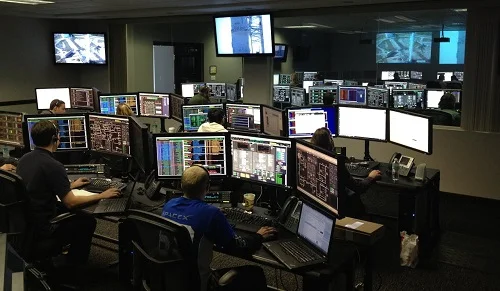Índice
The role of a security consultant is essential across various sectors, including healthcare, transportation, retail, mining, and banking. This profile requires more than just degrees in security or related fields; it demands a combination of knowledge, skills, and techniques.
If you're interested in how security consultants work, this article is a must-read. We’ll cover everything you need to know, from what the role involves to how you can train for it.

A security consultant can operate in both private settings (such as residential homes) and within businesses. This article focuses on the latter. In a corporate environment, a security consultant is a specialist in industry standards who assesses the surroundings to identify potential security threats.
Beyond identifying security risks, a consultant also develops and implements security measures. These measures are designed to be activated if threats materialize. For contingency plans to be effective, they must be tailored to the specific characteristics of the company.
The role of security professionals encompasses various responsibilities across different areas. Here’s a breakdown of what those functions include:
This role specifically involves studying, designing, and analyzing the security risks within a company. The evaluation process, which identifies potential threats, must meet two key criteria: it must be thorough and realistic.
After conducting the assessment and understanding the current security situation, the existing measures in place must be analyzed. This analysis helps determine whether they are adequate, and if necessary, new measures are proposed to mitigate the risks posed by these threats.
After analyzing security risks, the security consultant must design and project the systems needed for implementation within the company. The ongoing maintenance of these systems can be handled either by the consultant or by the company’s security technicians.
Once the security system is in place, it is crucial to test its functionality. Additionally, the proper use of the system must be verified, as its effectiveness in countering security threats depends on its correct application.
It's likely that the organization receiving consulting services already has security systems in place. In such cases, the consultant must thoroughly inspect and evaluate these systems to determine if they meet the current needs of the company.
Why is it important to inspect existing security systems? Organizations are dynamic, and their activities can introduce new risks and security needs. As a result, the systems in use may become outdated and require upgrades or adjustments.
If the company’s needs require it, security operations may include specialized training courses. These courses focus on the most effective measures, preparing employees and management to respond appropriately if a threat materializes.
Understanding what security consulting entails and the functions of a specialist in this field helps us recognize the importance of this service in an organization. One key reason for the significance of this type of consulting is that it is tailored to each company.
To customize risk assessments and the creation and implementation of security measures, a consultant considers various factors, including the company’s activities, the nature of the threat, the organization’s security culture, and even the geopolitical environment.
A specialized security consultant can quickly impart knowledge that would take a company without the right security professionals much longer to develop. Finally, security consulting enhances organizational efficiency and ensures the protection of its assets.
Security consultants have broad career prospects. They often work in corporate environments, whether medium or large-sized companies, where the focus is commonly on computer science, including data and IT systems.
Additionally, security consultants can find opportunities in the public sector, healthcare, education, and financial institutions. They may also work with non-profit organizations.
To become a security consultant, you need specific academic training, such as a degree in industrial engineering or industrial security. If you want to work in Information Technology, a degree in IT or Computer Science is also suitable.
Specialized courses in specific areas of industrial security, such as underground railway infrastructure, can be valuable. Additionally, you must develop both technical skills and interpersonal skills.
In summary, to work in security consulting, you must be well-prepared to perform the role and tackle its challenges effectively.

¡Muchas gracias!
Hemos recibido correctamente tus datos. En breve nos pondremos en contacto contigo.